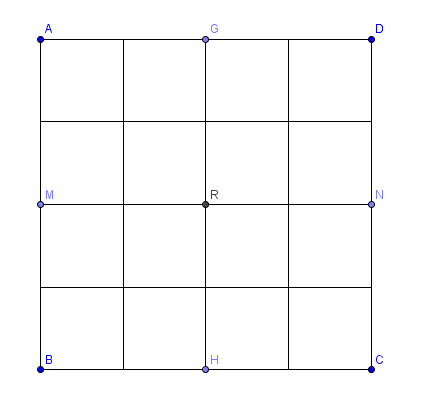RMO 2014 Delhi Region Q.4

Is it possible to write the numbers \(17,18,19,\ldots ,32\) in a \(4\times 4\) grid on unit squares, with one number in each square, such that the product of the numbers in each \(2\times 2\) sub-grids \(AMRG, GRND, MBHR\) and \(RHCN\) is divisible by 16?
No vote yet
1 vote
Easy Math Editor
This discussion board is a place to discuss our Daily Challenges and the math and science related to those challenges. Explanations are more than just a solution — they should explain the steps and thinking strategies that you used to obtain the solution. Comments should further the discussion of math and science.
When posting on Brilliant:
*italics*or_italics_**bold**or__bold__paragraph 1
paragraph 2
[example link](https://brilliant.org)> This is a quote# I indented these lines # 4 spaces, and now they show # up as a code block. print "hello world"\(...\)or\[...\]to ensure proper formatting.2 \times 32^{34}a_{i-1}\frac{2}{3}\sqrt{2}\sum_{i=1}^3\sin \theta\boxed{123}Comments
The answer is - impossible. Let us multiply all the numbers from 17 to 32 (the product will be equal to the product of four results for the sub-grids). It can easily be shown that the highest power of 2 in the product be 16. But as the number 32 (=2^5) should get in one of the sub-grids, the resultant 11th power of 2 should be distributed among three other grids. But it means that at least one of the products of the last three grids cann't be divisible by the fourth power of 2 equal to 16.
yes , 24=16
First let us write the prime factorization of all the even numbers ,
18=2∗9
20=22∗5
22=2∗11
24=23∗11
26=2∗13
28=22∗7
30=2∗15
32=25
The product of the numbers in 2x2 square to be divisible by 16 , each square should contain at least 2 raise to the power 4 . thus if in one 2x2 square if only 32 and other odd numbers is there - its satisfys . similarly - (18 , 20 ,22) , (20 ,28) ,(18 , 22 , 26 ,30) etc
Log in to reply
Nope If u place 32 in one of the sub grids u still need 12 factors of 2 (to be placed in the 3 other sub grids)but we are left with only 11 factors so such an arrangement is not possible
Log in to reply
Yes, I tried combinations, but all fell in vain.
Oh yes sorry i used 18 2 times Thank you . How much you are expecting to get right?@Aneesh Kundu
Log in to reply
I solved 4
Don't know how many are correct
We have 18=2×9, 20=22×5, 22=2×11, 24=23×3, 26=2×13,28=22×7, 30=2×15, 32=25.
I will consider the set of powers of 2,A= 1,2,1,3,1,2,1,5,0,0,0,0,0,0,0,0 (0 corrsponds to the power of 2 in the odd numbers).
Suppose we can partition the set A into 4 subsets X1,X2,X3,X4 where ∣Xi∣=4 where i=1,..,4 such that ki≥4 where ki denotes the sum of the elements of Xi.
Note that the sum of the elements of A is 16.
Clearly 5 belongs to one of the 4 subsets,say X1.Then k1≥5
Hence,k2+k3+k4=16−k1≤11 contradiction!(since sum of them is ≥12)
So, the arrangement given in the problem is impossible.
it would have been possible if we had one number having 2^1 . by the way .. i got problems 1 ,4 right . it was my first experience in rmo . . .
I solved it using pigeon hole principle